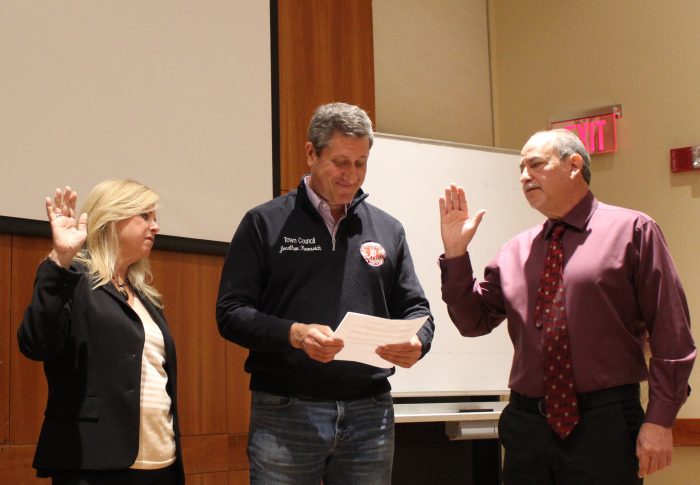Community choice aggregation, a revolution in energy procurement, is making a splash throughout Long Island.
Starting in May, the Town of Brookhaven will launch a CCA program, contracting with Manhattan-based Good Energy LLC for a fixed rate for natural gas consumers over the next two years.
In an interview, Town of Brookhaven Councilmember Jonathan Kornreich (D-Stony Brook) explained how the program would operate. Under the longstanding method of natural gas delivery in the town, National Grid — based in the U.K. and northeastern U.S. — purchases the supply and delivers the gas. CCA alters this dynamic.
“CCA is just a method of purchasing a commodity on a communitywide basis,” he said. Under the program, “all of the customers of National Grid in a certain area are getting together to say, ‘We’re going to jointly purchase fuel cooperatively from a different source.’”
That source, Good Energy, has agreed to supply gas at a fixed price of 69.5 cents per therm. “That locks in the price for all customers” for two years, the councilmember said.
National Grid, which still operates the delivery systems, will continue to bill customers for those services. The only section of the bill affected by the changes will be for energy supply.
An August report from the U.S. Energy Information Administration states that the natural gas market saw record volatility last year due to demand changes, storms and geopolitical unrest.
Given the many variables that contribute to fluctuations in gas prices, Kornreich suggested Brookhaven homeowners and businesses would be less beholden to the volatility of the market under CCA. “We’re going to pay just one price for the next two years,” he said.
The town is also hedging that the market price of natural gas will rise over the next two years. If that happens, CCA will deliver discounted gas to Brookhaven ratepayers throughout the contracted period.
“The expectation that I have, as given to me by the corporate representatives with whom I met, is that there’s going to be a savings to the customers,” Kornreich said. “My hope is that this price is competitive over a two-year period.”
He added, “Based on the models that they’ve shown me, this price will — over the long term — on average be lower than what they would have paid if they had just rode that market price.”
CCA: An energy revolution
‘A CCA can play a role in helping the residents to have more negotiation power.’
— Gang He
Community choice aggregation first came about in the 1990s as a model of procuring energy whereby a municipality can pool the buying power of its residents to negotiate favorable energy contracts.
Gang He is an assistant professor in the Department of Technology and Society at Stony Brook University, whose research focuses on energy and climate policy.
The assistant professor regarded the traditional relationship between energy consumers and suppliers as heavily skewed in favor of suppliers, referring to consumer protections under CCA as correcting the power imbalance.
“When utilities deal with residents, residents have no power,” Gang He said. “It’s a monopoly, and it’s heavily regulated by regulators. A CCA can play a role in helping the residents to have more negotiation power.”
Paul Fenn, founder and president of the Massachusetts-based CCA firm Local Power, drafted some of the original enabling legislation for CCA in Massachusetts, California and throughout the U.S. In an interview, he traced the history of CCA.
Fenn said vertically integrated investor-owned utilities have historically operated as monopolies and cartels, given their guaranteed rates of return by state regulators and energy market deregulation. CCA, he said, seeks to rectify this.
“The basic definition is that CCA is a model of energy supply that is neither a monopoly nor a cartel,” he said.
He likened the energy model to Costco. “The reason that large users achieve cheaper services is like going to Costco,” he said. “If you’re buying 200 rolls of toilet paper instead of 20, you pay a lower price.”
CCA applies this framework to the energy supply, giving the small consumer the perks of a bulk purchaser by pooling the buying power of entire communities.
“It’s a way for small users … to gain the economic buying power enjoyed by the largest corporations,” he said, adding, “The aggregations are designed to deliver the benefits to the user and not to the supplier.”
Two factors, according to Fenn, have contributed to the rise of CCA nationwide. On the one hand, the economic model has been tailored and perfected to benefit individual users over large suppliers. On the other hand, renewable technologies have progressed to the point where they are now competitive with fossil fuels.
Fenn characterized CCA as a revolution for capitalizing on the convergence of cheap renewable energy and consumer protections for utility power.
‘Community choice aggregation programs can be a great tool for getting community solar built, paid for and delivered to people.’
— Anne Reynolds
Promoting renewables
Anne Reynolds is executive director of Alliance for Clean Energy New York, a group of private companies and nonprofits partnering to expand green energy opportunities throughout New York state. Reynolds indicated that CCA could be interpreted in two ways — as an economic model or as a way to promote green energy.
CCA “can be purely an economics choice,” she said. “You can think of it as a collective buying co-op,” but “most of the examples in New York state are when the community also wants to get a renewable energy product.”
Reynolds stated that CCA is not the main objective of ACE NY as CCA “hasn’t been the primary way that renewable energy products are getting built in New York, which is what we focus on,” she said.
Her organization instead emphasizes the construction of large-scale, grid-connected renewable energy projects through long-term contracts with the New York State Energy Research and Development Authority.
Under the Climate Leadership and Community Protection Act, the state must procure 70% of its energy from renewable sources by 2030 and 100% by 2050. When asked whether CCAs offer a pathway toward a greener future in New York, Reynolds responded that there must be a mix of large-scale and small-scale projects.
“To get there, we’re going to need an unprecedented construction of renewable energy projects — offshore wind, wind, solar, batteries,” she said. “To get that done, these projects need to have a guaranteed market for their power, what they refer to as offtake agreements.”
She added, “Having those offtake agreements with the State of New York is one way to do it. Having the offtake agreements with communities in New York is another.”
One way CCA can promote new development in renewables, Reynolds said, is through community distributed generation, often referred to as community solar.
“Community choice aggregation programs can be a great tool for getting community solar built, paid for and delivered to people,” she said. “For the state to meet its goals, and for Long Island especially, it’s going to require a little bit of everything.”
The Southampton model
Brookhaven is not the only municipality in Suffolk County implementing CCA. In the neighboring Town of Southampton, local officials are exploring a different posture, with an energy plan geared toward electricity instead of natural gas.
Lynn Arthur is the energy chair of Southampton’s volunteer sustainability committee and the founder of the nonprofit Peak Power Long Island, a consultancy group that services municipalities and their constituents on renewable energy technologies.
Arthur said there are currently two CCA administrators operating on Long Island, Good Energy and Bedford Hills-based Joule Community Power, Southampton’s CCA administrator. She notes that the difference in administrators has placed the two municipalities on separate trajectories.
In Southampton, the Town Board is working toward obtaining electricity from 100% renewable energy sources by 2025. Arthur said that goal is coming into focus.
“It’s only natural that we would try to get a power supply contract for 100% renewables for electricity,” she said.
To meet this task, Arthur suggested CCA would play a pivotal role. She is now advocating for the Southampton Town Board to submit a request for proposal to supply electricity from 100% renewable sources.
Brookhaven vs. Southampton
Weighing Brookhaven’s CCA against Southampton’s, former New York State Assemblyman Steve Englebright (D-Setauket) suggested that Southampton has the upper hand.
“I think Southampton’s model is the better one,” he said. “Electricity is the future. We should be moving away from natural gas.”
But, he added, “to the extent that the Town of Brookhaven can get started with [CCA] is promising. I think the inevitable success of what Southampton is doing will compel their next-door neighbor, Brookhaven,” to follow suit.
Despite Brookhaven’s gas-exclusive CCA, Fenn did not say that gas aggregation was inherently brown and electricity aggregation green. Rather, he said promoting renewables through CCA is a matter of how a program is implemented.
He objected, however, to the limited scope of Brookhaven’s CCA initiative. “This program is defined narrowly as a discount-only program, and I think that’s not a particularly good idea,” he said. “It’s hard to argue against stabilizing people’s rates, but it won’t help the environment if that’s all they’re doing, and it may hurt it.”
Creating competition
‘I like the idea of moving away from monolithic energy sourcing.’
— Steve Englebright
Fenn regarded municipalities as sometimes prone to short-term thinking. While gas aggregation is a step toward unshackling ratepayers from the market’s volatility, he said it is incomplete.
Instead, he advised Brookhaven leaders to explore fuel switching, that is, transitioning residents from natural gas to electricity. The heat pump, for example, constitutes one way in which a home’s heating can be fulfilled by electric power instead of gas.
“Apart from the climate crisis, which says stop burning this stuff, there are so many reasons” to transition off fossil fuels, Fenn said. By fuel switching, “you’re adding electrical load when you do that, but you’re deleting gas demand.”
By creating a separate program for electrical aggregation, Fenn said Brookhaven could correct course, providing gas customers with greener options for heating.
Asked whether the Brookhaven Town Board could add a second CCA administrator for electricity, he responded affirmatively. “Just deliver both, and you can,” he said.
Arthur emphasized that municipalities can have separate CCA administrators for gas and electricity. She suggested Brookhaven add a second administrator for electricity to further competition.
“Fundamentally, if competition is good, and if you want everybody to go to electricity and get away from gas, then you should have [CCA administrators] compete with each other,” she said.
Local vs. centralized intervention
Fenn noted the decline of municipal power since the Civil War, which he said had rendered local governments impotent compared to their state and federal counterparts. He criticized the tendency of local officials to outsource services to third-party vendors.
“Part of the problem is the dependence on third parties cripples the governments by making them intellectually captive to those service providers,” he said. “We believe municipalities should have skin in the game and should use the power that they have.”
Fenn attributed the climate and garbage crises in the United States to the decline of municipal powers and the failures of centralized government. He encouraged local policymakers to embrace programs like CCA to counteract these downward movements.
“There has to be knowledge, responsibility and therefore control” vested in municipal government, he said. “CCA uses contractors to provide services, but they’re firmly under the control of the municipality.”
While CCA proposes a local solution to a global climate phenomenon, questions remain about the best forms of intervention.
For Reynolds, tackling the climate crisis requires a centralized intervention from the higher levels of government, with local governments doing their part as well. “We absolutely need both,” the ACE NY executive director said.
For the state to reach its aggressive emission mandates, “you’re going to need larger power projects, too, like offshore,” she said. “But it shouldn’t be an either or question.”
‘It’s so clear that this is such a great opportunity to move the needle on renewables and, at the same time, lower costs for their constituents.’
— Lynn Arthur
A sustainable future
Gang He viewed the growth in renewable energy, evidenced by over $1 trillion in worldwide investment last year, as a turning point in energy history.
“Renewables have gained momentum,” the SBU assistant professor said. “The challenge is how do we maintain the momentum to deliver the outcome that we desire?”
Arthur recommends CCA to local officials as a way to do so. “It’s so clear that this is such a great opportunity to move the needle on renewables and, at the same time, lower costs for their constituents,” she said.
Asked whether Brookhaven’s CCA could spur interest in a similar program for electricity, Kornreich expressed optimism that the town’s program would foster better energy stewardship.
“I hope that it does open people’s eyes to the possibility and to get people more comfortable with the concept of being a more conscious consumer of utility power,” he said. “Whether it’s gas or electric, people can understand they can choose and that their choices will have an impact on the environment.”
Though acknowledging some of the drawbacks to the Brookhaven program, Englebright expressed encouragement about moving away from the preexisting procurement structure.
“Great journeys are made a step at a time,” the former assemblyman said. “I like the idea of moving away from monolithic energy sourcing.” He added, “A more distributed power system is to our advantage, ultimately — more competitive, less monolithic and more responsive to the public.”
For more details on the Town of Brookhaven’s Community Choice Aggregation Program, visit the website brookhavencommunityenergy.com.
According to the website, “Eligible customers will soon receive additional information in the mail regarding product features, including information about the renewable energy option.”
Correction: In the print version of this article published on March 9, the town’s community choice aggregation administrator, Good Energy LLC, was misidentified as a London-based firm. In fact, Good Energy is headquartered in Manhattan. We apologize for the error.












